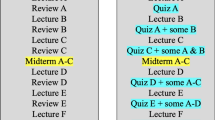Abstract
The testing effect shows that learning is enhanced by the act of recalling information after exposure. Although the testing effect is among the most robust findings in cognitive science, much of its empirical support is from laboratory studies and it has been applied as a strategy for enhancing learning in the classroom in a limited fashion. The purpose of this investigation was to replicate the testing effect in a university anatomy and physiology course and to extend the applicability of it to independent student study. Students repeatedly studied three sets of passages that described structures and concepts pertaining to (1) cardiac electrophysiology, (2) ventilation and (3) endocrinology. Each student was randomly assigned to study one of those three passage sets by reading it three consecutive times (R–R–R), another by reading and then rereading it while taking notes (R–R + N) and the third by reading it, recalling as much as possible (i.e., self-testing) and then rereading it (R–T–R). Retention assessed after 1 week was significantly greater following R–T–R (53.95 ± 1.72) compared to R–R–R (48.04 ± 1.83) and R–R + N (48.31 ± 1.78). Evidence is also presented that suggests students benefited from instructions to self-test when preparing for exams on their own. The testing effect, then, can be generalized to real-life settings such as university anatomy and physiology courses and to independent study situations.

Similar content being viewed by others
References
Alter, A. L., & Oppenheimer, D. M. (2009). Uniting the tribes of fluency to form a metacognitive nation. Personality and Social Psychology Review, 13, 219–235.
Bjork, R. A. (1994). Memory and metamemory considerations in the training of human beings. In J. Metcalfe & A. Shimamura (Eds.), Metacognition: Knowing about knowing (pp. 185–205). Cambridge, MA: MIT Press.
Bjork, R. A., & Bjork, E. L. (2011). Making things hard on yourself, but in a good way: creating desirable difficulties to enhance learning. In M. A. Gernsbacher, R. W. Pew, L. M. Hough, & J. R. Pomerantz (Eds.), Psychology and the real world: Essays illustrating fundamental contributions to society (pp. 56–64). New York: Worth.
Einstein, G. O., Mullet, H. G., & Harrison, T. L. (2012). The testing effect: Illustrating fundamental concept and changing study habits. Teaching of Psychology, 39, 190–193.
Hartwig, M. K., & Dunlosky, J. (2012). Study strategies of college students: Are self-testing and scheduling related to achievement? Psychonomic Bulletin & Review, 19, 126–134.
Karpicke, J. D., & Blunt, J. R. (2011). Retrieval practice produces more learning than elaborative studying with concept mapping. Science, 331, 772–775.
Karpicke, J. D., & Roediger, H.L. (2008). The critical importance of retrieval for learning. Science, 15, 966–968.
Kornell, N., & Bjork, R. A. (2007). The promise and perils of self-regulated study. Psychonomic Bulletin & Review, 6, 19–24.
Kornell, N., & Bjork, R. A. (2009). A stability bias in human memory: Overestimating remembering and underestimating learning. Journal of Experimental Psychology: General, 138, 449–468.
Larsen, D. P., Butler, A. C., & Roediger, H. L. (2008). Test-enhanced learning in medical education. Medical Education, 42, 959–966.
Larsen, D. P., Butler, A. C., & Roediger, H. L. (2009). Repeated testing improves long-term retention relative to repeated study: A randomized controlled trial. Medical Education, 43, 1174–1181.
Lipowski, S. L., Pyc, M. A., Dunlosky, J., & Rawson, K. A. (2014). Establishing and explaining the testing effect in free recall for young children. Developmental Psychology, 50, 994–1000.
Logan, J. M., Thompson, A. J., & Marshak, D. W. (2011). Testing to enhance retention in human anatomy. Anatomical Sciences Education, 4, 243–248.
Lyle, K. B., & Crawford, N. A. (2011). Retrieving essential material at the end of lectures improves performance on statistics exams. Teaching of Psychology, 38, 94–97.
McCabe, J. A. (2011). Metacognitive awareness of learning strategies in undergraduates. Memory & Cognition, 29, 222–233.
McDaniel, M. A., Agarwal, P. K., Huelser, B. J., McDermott, K. B., & Roediger, H. L. (2011). Test-enhanced learning in a middle school classroom: The effects of quiz frequency and placement. Journal of Educational Psychology, 103, 399–414.
McDaniel, M. A., Howard, D. C., & Einstein, G. O. (2009). The read-recite-review study strategy: Effective and portable. Psychological Science, 20, 516–522.
Meyer, D. H., & Logan, J. M. (2013). Taking the testing effect beyond college freshman: Benefits for lifelong learning. Psychology and Aging, 28, 142–147.
National Academy of Sciences. (2007). Rising above the gathering storm: Energizing and employing America for a brighter economic future. Report from the Committee on Prospering in the Global Economy of the 21st Century. Washington, DC: The National Academies Press.
National Commission on Mathematics and Science Teaching for the 21st Century. (2000). Before it’s too late. Washington, DC: U.S. Department of Education.
Rawson, K. A., & Kintsh, W. (2005). Rereading effects depend on time of test. Journal of Educational Psychology, 97, 70–80.
Roediger, H. L., Agarwal, P. K., McDaniel, M. A., & McDermott, K. B. (2011). Test-enhanced learning in the classroom: Long-term improvements from quizzing. Journal of Experimental Psychology: Applied, 17, 382–395.
Roediger, H. L., & Karpicke, J. D. (2006). The power of testing memory: Basic research and implications for educational practice. Perspectives on Psychological Science, 1, 181–210.
Tullis, J. G., Finley, J. R., & Benjamin, A. S. (2013). Metacognition of the testing effect: Guiding learners to predict the benefits of retrieval. Memory & Cognition, 41, 429–442.
Wing, E. A., Marsh, E. J., & Cabeza, R. (2013). Neural correlates of retrieval-based memory enhancement: An fMRI study of the testing effect. Neuropsychologia, 51, 2360–2370.
Acknowledgments
None.
Author information
Authors and Affiliations
Corresponding author
Rights and permissions
About this article
Cite this article
Dobson, J.L., Linderholm, T. Self-testing promotes superior retention of anatomy and physiology information. Adv in Health Sci Educ 20, 149–161 (2015). https://doi.org/10.1007/s10459-014-9514-8
Received:
Accepted:
Published:
Issue Date:
DOI: https://doi.org/10.1007/s10459-014-9514-8




